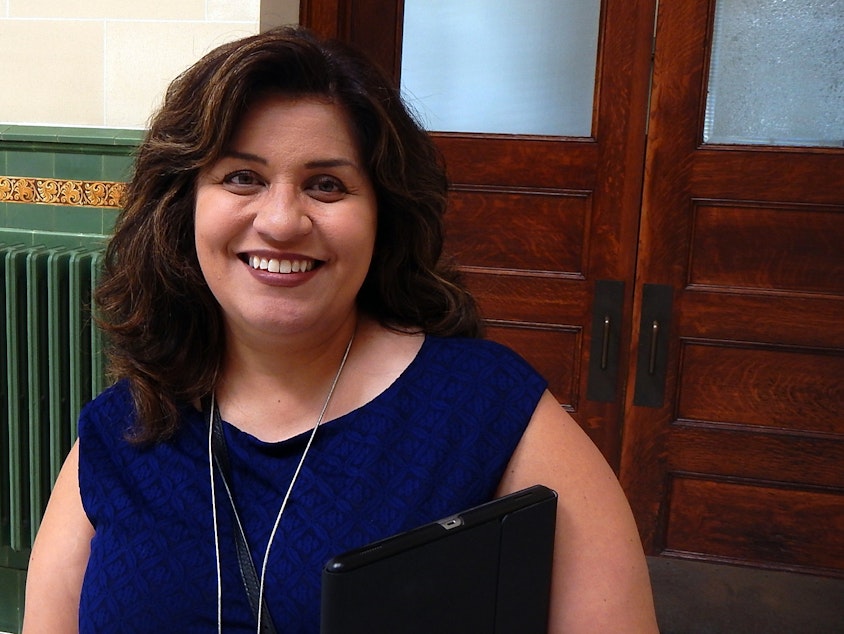(Slightly) faster light rail approved by Sound Transit

Seattle-based Sound Transit has made its plan to expand regional transit slightly faster and slightly more expensive.
With revisions approved by the Sound Transit board on Thursday, the plan known as ST3 would add 62 miles of light rail over the next quarter century at a cost of $54 billion.
Many neighborhoods would get rail service a few years earlier than originally proposed. Redmond and Federal Way would get light rail in 8 years; Ballard, Everett and parts of Tacoma would have to wait 19 to 23 years.
That is, if voters agree to pay for the most expensive collection of public works projects ever put on the ballot here.
At Thursday's special meeting, the Sound Transit board sat at its big U-shaped table at the agency's headquarters. All around that table, the elected officials patted themselves on the back.
Sponsored
"We have done outstanding work to be at this point," King County Council Chair Joe McDermott said.
"I'm delighted where we are at this special board meeting," Issaquah Mayor Fred Butler said.
"Getting us to this point has been a remarkable effort by a board of truly regional-minded leaders," board chair and King County Executive Dow Constantine said.
The point they refer to is having a long list of rail and bus projects just about ready to send to voters.
"You may clap now," Constantine told the audience of transit advocates and others after the motion passed.
Sponsored
A final board vote to put the ST3 measure on the November ballot is set for June 23.
The $54 billion question is whether voters will share Sound Transit's upbeat mood come November.
Polls and public meetings have shown a strong interest in improving the rapidly growing region's transit as soon as possible. But voters in some areas might feel they're not getting their money's worth.
"In 25 years, we're going to be basically the only city without light rail," Renton city council member Ruth Pérez testified before the board.
"Redmond's going to get one. Kirkland's going to get one. Issaquah's going to get one," she said.
Sponsored
Pérez, who grew up riding the subway system in Mexico City, called Renton the most diverse city in Washington and the second-largest city on King County's Eastside.
"We don't have a seat on the table," Pérez said. "You don't have a seat at the table, you're part of the menu."
She asked the board to add a light rail spur to Renton as a "provisional" project. It would only get built if the agency ends up with money left over after building the rest of its regional plan.
The revised ST3 would bring Bus Rapid Transit service along Interstate 405 to Renton, with a new station and parking lot at Northeast 44th Street.
Critics with the nonprofit Smarter Transit say ST3's heavy reliance on light rail ensures that it delivers less transit service, and does so more slowly, than if the money were spent to improve the frequency and reliability of bus service.
Sponsored
Light rail projects would get 86 percent of the funds that ST3 puts into capital projects. Commuter rail and bus projects would each get 6 percent, according to Sound Transit.
Board member and Sumner mayor Dave Enslow asked for a provisional project to extend commuter rail to Orting in eastern Pierce County, which he said is growing rapidly.
"East Pierce County now, I think is becoming the affordable housing bank for King County and maybe the rest of Pierce County," Enslow said.
Sound Transit CEO Peter Rogoff said commuter rail in Pierce County is currently Sound Transit's fastest-growing service, and the agency is negotiating with Burlington Northern Santa Fe to run more commuter trains on the company's tracks.
Dow Constantine said there are many good projects that Sound Transit can't afford to build. He and other board members expressed reluctance to add provisional projects.
Sponsored
"We are hesitant to hold out for the public projects that in all likelihood that cannot be afforded within this plan," Constantine said. "We don't want to promise people something we can't deliver."
ST3 would cost the average taxpayer $200 a year, on top of the $170 each taxpayer in the region already pays annually to Sound Transit for ongoing transit projects approved by voters in 2008.

